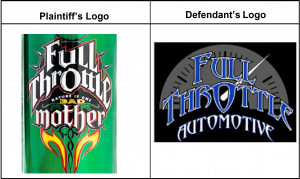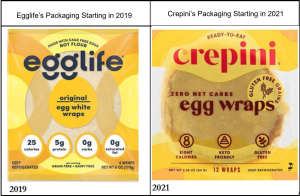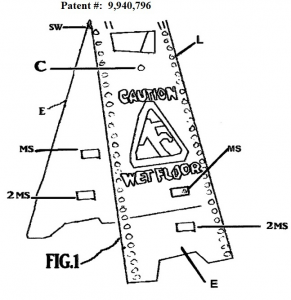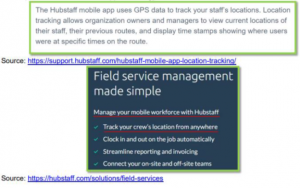| Patent No. |
Title |
| D0926,292 |
Faucet |
| D0926,291 |
Faucet |
| D0926,144 |
Contact |
| D0926,104 |
Wheel chock |
| D0926,078 |
Buckle system |
| D0926,018 |
Knob |
| D0925,933 |
Banquette |
| 11,074,802 |
Method and apparatus for automatic event prediction |
| 11,074,674 |
Imaging noise reduction system and method |
| 11,073,322 |
Modular heat transfer system |
| 11,073,200 |
Embedded auxiliary oil system for gearbox protection |
| 11,073,083 |
Particle separator |
| 11,073,045 |
Turbine shroud assembly with case captured seal segment carrier |
| 11,073,026 |
Turbine shroud assembly with multi-piece support for ceramic matrix composite material seal segments |
| 11,072,162 |
Methods and apparatus for compensating for thermal expansion during additive manufacturing |
| 11,072,096 |
Apparatuses and methods to mold complex shapes |
| 11,071,831 |
Dose detection system module for medication delivery device |
| 11,071,819 |
Valve drive unit with shape memory alloy actuator |
| 11,071,666 |
Systems, methods, and devices for treatment of sleep disorders |
| 11,071,636 |
Thoracic aorta stent graft with access region |
| 11,071,535 |
Vascular anchoring introducer sheath |
| 11,071,521 |
Internal ultrasound assembly with port for fluid injection |
| 11,071,454 |
Identification of device location in healthcare facility |
| 11,071,393 |
Apparatus for adding hospital bed functionality to an at-home bed |
| D0925,517 |
Communication console |
| D0925,306 |
Mattock tool |
| 11,071,201 |
Method and apparatus for terminating an electrical cable to an integrated circuit |
| 11,070,943 |
Systems and methods for identifying parties based on coordinating identifiers |
| 11,070,290 |
System and method for using a solar cell in wireless communication |
| 11,068,403 |
Data processing system for prefetching data to buffer entries and operating method of the data processing system |
| 11,067,588 |
Medical analyte testing system and operating method therefor |
| 11,067,509 |
Fluorescent microscope |
| 11,067,029 |
Systems and methods for coupling a cylinder head to a cylinder block |
| 11,067,015 |
Systems and methods for cylinder deactivation operation in response to route conditions |
| 11,067,014 |
System and method for reducing engine knock |
| 11,067,006 |
Gas turbine engine system with synchronization features for gearbox operation |
| 11,066,973 |
Heating system for a tank header of aftertreatment system and method of heating a tank header |
| 11,066,947 |
Turbine shroud assembly with sealed pin mounting arrangement |
| 11,066,849 |
Adjustable decorative lockset rose assembly |
| 11,066,460 |
Phage display vectors and methods of use |
| 11,066,386 |
CGRP receptor antagonists |
| 11,066,256 |
Grain bin powersweep with sump shaft aperture sealing cover plate assembly |
| 11,066,249 |
Loading table roller brush assembly |
| 11,066,247 |
Powersweep including gearbox shifter mechanism |
| 11,066,051 |
Wheel sensors within vehicular brake assemblies |
| 11,065,808 |
Methods and apparatus for compressing material during additive manufacturing |
| 11,065,391 |
Automatic injection device with variable dosing |
| 11,065,386 |
Automatic medication injection device with audible indication of injecting progress |
| 11,065,368 |
Drug eluting graft constructs and methods |
| 11,065,216 |
Compositions and methods for regulating body weight and metabolic syndromes |
| 11,065,130 |
Expandable spinal implant system and method of using same |
| 11,065,123 |
Compression resistant implants including an oxysterol and methods of use |
| 11,065,103 |
Method and apparatus for fixation of an ACL graft |
| 11,065,065 |
Spinal implant system and methods of use |
| 11,064,987 |
Volumetric grafts for treatment of fistulae and related methods and systems |
| 11,064,822 |
Snap together frame |
| RE048,635 |
ERK inhibitors |
| D0925,160 |
Cremation urn |
| D0925,032 |
Component for a drug delivery device |
| D0925,014 |
Handshower holder |
| D0925,008 |
Faucet handle |
| D0925,007 |
Faucet |
| D0924,983 |
Children’s ride-on vehicle |
| 11,063,445 |
Multi-cell battery management device |
| 11,062,707 |
Voice recognition for patient care environment |
| 11,062,541 |
Automated architectural specification generation and hardware identification |
| 11,061,482 |
Force sensitive input devices and methods |
| 11,061,035 |
Charged mass labeling system |
| 11,060,998 |
Nonlinear mass sensors based on electronic feedback |
| 11,060,978 |
Methods of determining an analyte concentration in a body fluid sample having disturbance variables, as well as computer programs and devices therefor |
| 11,060,959 |
Systems and methods for analyzing an analyte extracted from a sample using an adsorbent material |
| 11,060,939 |
Diagnosing cylinder pressure sensor gain and offset |
| 11,060,578 |
Conical spring washer, transmission system, and method of assembly thereof |
| 11,060,468 |
Engine intake air system including CAC bypass and separate bypass heater, and high-efficiency spark-ignited direct injection liquid propane engine architectures including same |
| 11,060,451 |
Fuel injector cleaning system, fluid, and method |
| 11,060,434 |
Reductant injection in exhaust manifold |
| 11,060,004 |
Adhesives and methods of making the same |
| 11,059,504 |
Technologies for caddy assemblies |
| 11,059,416 |
Electrochromic adaptive driving beam system and method |
| 11,059,413 |
Retractable room actuation assembly for recreational vehicle |
| 11,059,369 |
Diesel exhaust fluid tank venting system |
| 11,059,359 |
Tonneau cover tie-down assembly |
| 11,059,259 |
Composite core with reinforced plastic strips and method thereof |
| 11,059,227 |
Print head for additive manufacturing |
| 11,058,976 |
Valve-sensor assembly |
| 11,058,805 |
Compositions and devices incorporating water-insoluble therapeutic agents and methods of the use thereof |
| 11,058,554 |
Hard bearing inserter rings |
| 11,058,495 |
Surgical system having assisted optical navigation with dual projection system |
| 11,058,464 |
Interspinous process fixation devices, systems, instruments and methods of assembly and use |
| 11,058,368 |
Distributed healthcare communication system |
| 11,058,108 |
Stable high strength oil-in-water emulsions |
| 11,058,092 |
Animal crate with swing or drop door |
| 11,058,089 |
Soybean variety 5PVSQ69 |
| 11,058,055 |
Airflow for an agricultural harvesting combine |
| D0924,441 |
Beam |
| D0924,392 |
Component of a drug delivery device |
| D0924,391 |
Component for a drug delivery device |
| D0924,378 |
Non-return device valve member |
| D0924,371 |
Faucet |
| D0924,370 |
Faucet |
| D0924,366 |
Faucet |
| D0924,365 |
Faucet body |
| D0924,364 |
Faucet |
| D0924,358 |
Faucet sprayhead |
| D0924,170 |
Electrical connector |
| D0924,169 |
Electrical connector |
| D0924,035 |
Knob |
| D0923,965 |
Towel bar |
| 11,057,722 |
Hearing aid for people having asymmetric hearing loss |
| 11,057,240 |
Method and process for securing an executable image |
| 11,056,838 |
Transceiver receptacle with EMI cage and bezel clips that provide high shielding effectiveness |
| 11,056,329 |
ESI-MS via an electrokinetically pumped interface |
| 11,055,386 |
Controlling user access to a medical system |
| 11,054,318 |
System for nondestructive residual stress profiling using inductive sensing |
| 11,054,114 |
Illuminating, spinning device |
| 11,054,039 |
Seal runner support |
| 11,053,962 |
Method and apparatus of plasma flow control for drag reduction |
| 11,053,881 |
Hierarchical engine control systems and methods |
| 11,053,830 |
Mixer for NOx sensor |
| 11,053,828 |
Separately determining firing density and pumping density during firing density transitions for a lean-burn internal combustion engine |
| 11,053,817 |
Turbine shroud assembly with ceramic matrix composite blade track segments and full hoop carrier |
| 11,053,806 |
Brazed blade track for a gas turbine engine |
| 11,053,801 |
Gas turbine engine composite vane assembly and method for making the same |
| 11,053,646 |
Helicopter and VTOL aircraft landing pad information sheet |
| 11,053,578 |
Removing coatings from ceramic matrix composite substrates |
| 11,053,544 |
Corn event DAS-59122-7 and methods for detection thereof |
| 11,053,511 |
Production of DHA and other LC PUFAs in plants |
| 11,053,290 |
Modified Tamm-Horsfall protein and related compositions and methods of use |
| 11,053,214 |
Compositions and methods related to pyridinoylpiperidine 5-HT.sub.1F agonists |
| 11,053,003 |
Cyclorotor thrust control, transmission and mounting system |
| 11,052,878 |
Manually-operable hydraulic stabilizing system |
| 11,052,192 |
Disposable inserter and reusable inserter for accommodating a disposable inserter |
| 11,052,153 |
Highly branched alpha-D-glucans |
| 11,052,009 |
Device for adjustably supporting portions of a patient for surgery |
| 11,052,008 |
Surgical frame and method for use thereof facilitating patient transfer |
| 11,051,961 |
Deployment handle with stabilizing rail for a pre-loaded prosthesis delivery device |
| 11,051,899 |
Surgical draping system and method |
| 11,051,865 |
Fixation of bone implants |
| 11,051,859 |
Spinal correction system and method |
| 11,051,854 |
Spinal implant system and method |
| 11,051,770 |
Patient positioning support structure |
 Hammond, Indiana – Pro se Plaintiff, Xavier Gatewood (“Gatewood”) claims to perform comedy in the Chicago area. Between 2014 and 2015, Gatewood claims Defendant, David Khari Webber Chappelle (“Chappelle”), saw him performing comedy at one or more of four places located within two miles of Chappelle’s movie shoot for “CHI-RAQ.”
Hammond, Indiana – Pro se Plaintiff, Xavier Gatewood (“Gatewood”) claims to perform comedy in the Chicago area. Between 2014 and 2015, Gatewood claims Defendant, David Khari Webber Chappelle (“Chappelle”), saw him performing comedy at one or more of four places located within two miles of Chappelle’s movie shoot for “CHI-RAQ.”









